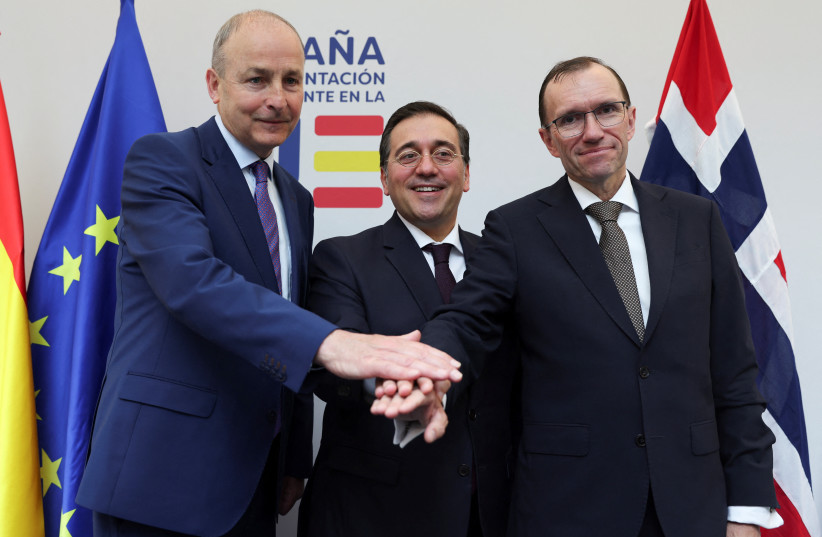Saudi Arabia is concerned by Israel’s refusal to accept a two-state resolution to its conflict with the Palestinians, Saudi Foreign Minister Faisal bin Farhan told reporters in Brussels as he lauded the three European countries that have unilaterally recognized Palestinian statehood.
“I firmly believe,” Prince Faisal said on Sunday night, “that a two-state solution with the establishment of a credible Palestinian State serves … the interest of the Palestinians and delivers [on] their right to self-determination.
“It is also in the interest of Israel and delivers the security that Israel needs and deserves.
“The fact that the current government in Israel doesn't realize that, of course, is a matter of extreme concern,” he said.
He spoke in Brussels at a press conference with European Union foreign policy chief Josep Borrell and Norwegian Foreign Minister Espen Bathe Eide on the sidelines of two days of events on the Israeli-Palestinian conflict hosted by Brussels.

They took place as the Norwegian, Irish, and Spanish unilateral recognition of Palestinian statehood was set to officially go into effect on Tuesday.
Prince Faisal, who attended the Brussels meetings said, it was important “to reinvigorate the two-state solution independent of Israel's position because Israel doesn't get to decide whether or not the Palestinians have a right to self-determination.”
The Norwegian, Irish, and Spanish unilateral recognition of Palestinian statehood, he said, “is not just symbolic." It “re-emphasizes the viability of the two-state solution. … So we encourage others to do so,” Prince Faisal said.
Borrell stated that “the two-state solution is not a painful concession that Israel” must make nor is it “a security threat” to Israel.
“On the contrary, it is the only long-term guarantee for the security and prosperity of Israel.
“I know that the current Israeli government is not convinced of that” but its allies must work to advance it because it’s "the only solution that we can imagine to bring peace and security to the two people who are fighting for the same land.”
Netanyahu government hardens stance since October 7
Prime Minister Benjamin Netanyahu’s current government, which has opposed Palestinian statehood since it was sworn into office at the end of December 2022, has hardened that stance in the aftermath of the Hamas-led October 7 invasion of Israel.
It has argued that unilateral Palestinian recognition legitimizes that attack, in which over 1,200 people were killed and another 252 seized as hostages. Some 125 of those captives remain in Gaza.
Earlier this year the Israeli government and the Knesset declared their opposition to unilateral Palestinian statehood but did say it would support a negotiated process with the Palestinians that lead to two states.
Netanyahu’s critics on the Right, have held that the declaration which passed the Knesset by 99 to 120 votes, was a backhanded way of supporting negotiations for two states.
Neither Netanyahu nor his top officials, however, have been willing to state so publicly and have instead expressed concern that a Palestinian state would, in a manner akin to Gaza, become another terror stronghold.
The Israeli government’s vocal opposition to Palestinian statehood, coupled with the ten-year absence of any negotiated Israeli-Palestinian peace process, has pushed some European countries to change their position on Palestinian statehood.
Many Western and European countries had in the past believed that Palestinian statehood recognition should come at the end of a two-state process.
Now they view it as a supportive step to reinvigorate the process, particularly at a time when the United States is working to advance a normalization deal between Israel and Saudi Arabia.
